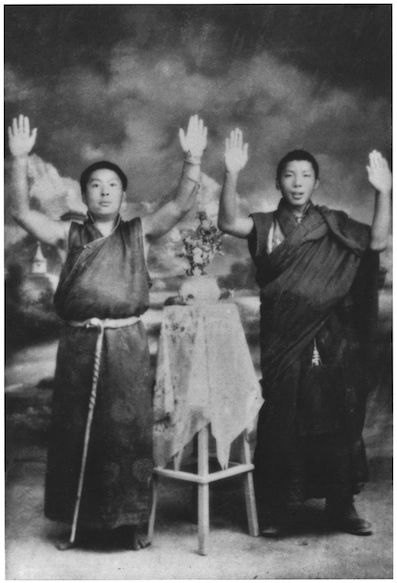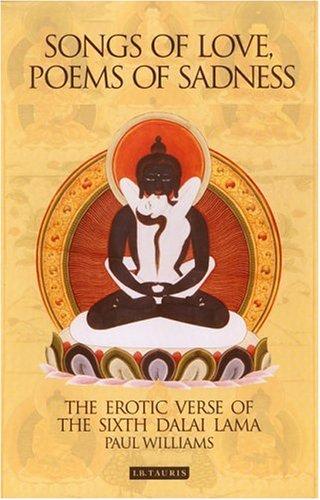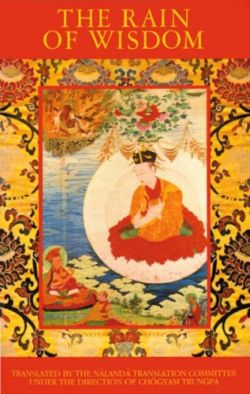Chögyam Trungpa and Nalanda Translation Committee (tr.)
The Rain of Wisdom: The Essence of the Ocean of True Meaning
Trungpa, Chögyam; Nalanda Translation Committee (tr.);
The Rain of Wisdom: The Essence of the Ocean of True Meaning (The vajra songs of the Kagyu gurus)
Shambhala Publications (Nalanda Translation Commission), 2010, 384 pages
ISBN 1590309014, 9781590309018
topics: | buddhism | tibet | poetry | anthology |
Review
The Kagyu sect of Tibetan Buddhism is a one of the tantra-infused or vajrAyana schools, founded by Marpa Chokyi Lodro (1012–1097), a prominent translator of the second wave of texts from India. Marpa trained under Naropa in India, who was a disciple of Tilopa in Bengal. He established his center in in Lhodrak in Southern Tibet, just N of Bhutan.
The sects greatest exponent however, was perhaps Jetsun Milarepa (1040-1123), a tantric yogi of mythical powers.
Among the Kagyu schools is the Karma Kagyu, to which tradition most of these songs belong. The Karma sect is currently embroiled in the Karmapa controversy. [one line continues at the Rumtek monastery in Sikkim].
The Trungpa lineage are traditionally the abbots of the Surmang monastery in East Tibet, one of the centers of the Karma Kagyu.
Chogyam Trungpa biography
As an infant in eastern Tibet, Chogyam Trungpa Rinpoche (b. 1939) was discovered as the eleventh incarnation in the Kagyu Trungpa line, who traditionally head the Surmang monastery in Kham (present day Yushu Tibetan autonomous province in Qinghai). As a child, he underwent a rigorous training in the Kagyu regime, including in what is known as crazy wisdom, by the master Khenpo Gangshar.
The name Chogyam = Chökyi, dharma + Gyamtso, ocean;
Rinpoche = (revered) guru;
Trungpa = servant, attendant.
He is also known as VidyAdhara (receptacle of knowledge)
 Khenpo Gangshar (left) with the young Trungpa at Surmang,
(maybe 1957).
Gangshar was about 15 years older. He had trained in the
Nyingma tradition, but he lived an unconventional life, got
married, and preached an unorthodox style of meditation.
He is said to have revived miraculously after death, and
continued to teach for a year.
Khenpo Gangshar (left) with the young Trungpa at Surmang,
(maybe 1957).
Gangshar was about 15 years older. He had trained in the
Nyingma tradition, but he lived an unconventional life, got
married, and preached an unorthodox style of meditation.
He is said to have revived miraculously after death, and
continued to teach for a year.
In India and the West
After the Chinese annexation of Tibet and the Tibetan protests of 1959, Chögyam Trungpa escaped to India in 1959. Five years younger than the Dalai Lama, he arrived in Dharmashala and managed a school for young monks for some years. Here he began learning English and attempting to connect with the West. In 1963, he obtained a scholarship to study Comparative Religion at Oxford University. From 1967, he ran the Samye Ling monastery in Scotland for three years, when he moved to the US. In this period, he was driving one day when he blacked out at the wheel and crashed, resulting in a lifelong partial paralysis. In his autobiography, he notes this incident as a spiritual turning point, along with an earlier visit to a cave in Bhutan. After this episode, he gave up his vows and his monastic robes, and started sleeping with women, many of them his own students. He married a 16 year old student from an affluent family, Diana Mukpo (see interview - Married to the guru). In his later years, he was often drunk in public. These aspects of his life generated considerable controversy. In the US, he gathered a group of disciples and founded the Shambhala community (later the Vajradhatu school, headquartered at Boulder, Colorado. This includes the Naropa university, and many meditation centers, including the Karme Choling monastery in Vermont. At the Naropa school, he managed to attract a number of noted poets - Robert Bly, Allen Ginsburg, and R.S. Merwin among them. In a notorious incident at the Naropa Snowmass seminary in 1975, Merwin and his partner Dana Naone, were dragged out of their room and forcibly stripped at an event where the guru and everyone else were naked. (see https://en.wikipedia.org/wiki/Chögyam_Trungpa#Controversies)
Translation activities
The Trungpa, (see foreword below), felt a need for translating and preserving the Tibetan texts in the West. He is well known for his extensive translation activities. The Rain of Wisdom is a translation effort carried out under his guidancee by a group of his US disciples, under tight time deadlines. The quality of the translations are mediocre, though they do hold interest at times, as in Milarepa's lament after seeing his devastated homestead. After his death in 1987, the Vajradhatu school is being managed by his son. Meanwhile, the twelfth Trungpu master, Chosen Trungpa was identified in Tibet in 1991.
Excerpts
from the Foreword : Chogyam Trungpa
Because of the destruction of Tibetan tradition and the disruption of the Kagyü dharma by the recent Communist takeover of Tibet, ... some small deeds to kindle the Practice Lineage [have become necessary]. Here in North America, a group of sincere students has gathered around me — dedicated practitioners who are free from arrogance, students who do not lean on their Kagyü religion in order to glorify their individual egos. I am very pleased to present this translation of The rain of wisdom, the Kagyu Gurtso. I feel highly inspired by the translation work that I and my students have done. I am realizing for the first time that the basically theistic English language has now been blessed by the Practice Lineages and is becoming a great medium for expressing the nontheistic, enlightened dharma. I and my translators have worked very hard and feel somewhat proud of what we have produced. When I was eight my tutor recommended that I use the life of Milarepa as part of my reading practice. I remember clearly the illuminated manuscript of Milarepa's life that 1 used. Occasionally I would look at the illustrations and try to understand the contents. Reading this text not only improved my literacy. but aroused my feeling for the Kagyu tradition and my admiration of Milarepa's life and his asceticism. I wept and laughed as my reading practice went on. Sometimes my tutor thought that I was weeping because I missed my mother, or because I was trying to get out of the harsh discipline that was part of my training. I used to tell him, "No, I'm crying because of what I am reading." So this reading had a profound effect on me. In fact, reading this book inspired me to compose beginning level songs myself... ... each time I open The Rain of Wisdom and read a few passages it makes me appreciate the hardships that our forefathers endured for the sake of future generations such as ourselves. Needless to say, these songs should be regarded as the best of the butter which has been churned from the ocean of milk of the Buddha's teachings. These songs should not be regarded as ordinary poetry, as a purely literary endeavor. Traditionally they are known as vajra dohas. These vajra dohas of the Kagyü forefathers are read annually in the celebration of the parinirvana of Milarepa by a group of students who have accomplished the preliminary discipline of entering into Buddhism, taken the vow of benevolence of the bodhisattva path, and also glimpsed the power of vajrayana, so that they are not fearful, but further inspired. [...] I dedicate this book, The Rain of Wisdom, and its translation to all sentient beings without exception. May they benefit by it—those who oppose the Kagyü dharma of Vajradhatu as well as those who join in. Without exception, anyone who has had the slightest contact with our Kagyü dharma, whether with positive or negative reactions, is bound to become liberated. With my humble duty, I remain a mere speck of dust. Since the forefathers wish to burden me with the responsibilities of a vajracarya and vidyadhara, I remain a humble servant of the Practice Lineage. The Vidyadhara, Vajracarya the Venerable Chökyi Gyatso, the Eleventh Trungpa March 4, 1980
The songs
Namo Gurave
you who bind the secret joy, Sri Heruka, i supplicate you. in the charnel ground of the play of joy and light, wisdom DAkini consort, i supplicate you. in the secret bhaga of the land of uDDiyANa, glorious buddha tilopa, i supplicate you. in the sphere of activity of the wisdom DAkini consort, The mahapaNDita, great siddha Naropa, i supplicate you. [...] Glorious conqueror of the hordes of the four maras, Lord Padma Wangchok, I supplicate you. You who liberate those poisoned with the ignorance of dualistic fixation, Lord Jamgon Guru, I supplicate you. May I be liberated from the sophistries of the two truths of dharma. In the nakedness of true ordinary mind, Which is the penetrating path of abandoning hope and fear, May I realize buddha in the palm of my hand.
The songs of Jetsun Milarepa
[Jetsun] Milarepa (མི་ལ་རས་པ་) (1040-1123) is considered to be one of the foundational figures in the Kagyü school of Tibetan Buddhism.
Namo Gurave (salutation to Milarepa)
p.165 The one born in the land of snow, Is untainted by worldly faults Blessed by the lineage of NAropa, He practices wondrous austerities; The supreme physician who cures the ills of beings,a Object of prostrations, renwoned like the sun and moon He is widely famed with the name of Mila To this repa, I respectfully prostrate He realized the futility of saMsara, Wandering in mountain solitudes, without regard for food or clothing, He realized bliss and warmth, and so captured the essential point of the life force Jetsun Mila, I praise you and prostrate.
Taking leave of the Guru
Milarepa is taking leave of his Guru, Marpa Rinpoche p.165-66 Kind lord, whose essenceis Aksobhya May ths lowly one go to his homeland once more: To see if my mama, th vessel that bore me, Is now broken or not, To see if my sister Peta Paldren Is now well or not, To see if my neighbour Uncle Yungpal Is now dead or not, To see if my aunt Khyungza Paldren Is unhappy or not, To see if the house of four pillars and eight beams Has now fallen or not, To see if the triangular cultivated field Ormo Is now overgrown with weeds or not, To see if the many books of holy dharma Now remain there or not, To see if the resident monk Lhabum Is now well or not.
The virtues of realizing the futility of saMsAra
p.172 [when he returns home, he finds his house in ruins. The bleached bones of his mother lie on the threshold. His father is dead, his sister has become a beggar. His mind awhirl, he sings:] What should I do, what should I do? There is nothing better than dharma Vajradhara, lord whose essence is Aksobhya, Grant me your blessings so that this lowly one may keep to retreat. This home of four pillars and eight beams These days is like the upper jaw of a lion. ... an example of impermanence and illusion. see the response of the master, in a different (and somewhat more literary) version, see http://www.ktgrinpoche.org/songs/departing-wishes
biography Milarepa
from http://rywiki.tsadra.org/index.php/Milarepa Milarepa was born in Gungtang in Upper Tibet. He first learned black magic and killed many enemies. Later, feeling remorse for his negative actions, he went to Lhodrak to meet the great Marpa Rinpoche. For about six years and eight months, Marpa made him undergo great hardship for the sake of the Dharma, such as building a nine storey tower, before he finally granted him all the empowerments and instructions. At the age of forty-five, in the Wood Mouse year (1084), Milarepa went to Upper Tibet, and for nine years, moved through Kyirong and Nyal. There he endured hardships, such as wearing only a simple cotton cloth and sustaining himself on nettles, and meditated with such fierce determination that he gained the supreme accomplishment within that very lifetime. Then he went to other places, coming and going, giving instructions of the secret mantra to those who were worthy disciples, and composing many songs of realisation. Finally, in the Water Hare year of the second sexagenary cycle, he departed.[2] His many disciples, and disciples' disciples founded all of the Kagyü sub-schools. links: website of the Chogyam Trungpa center: http://chronicleproject.com/ Also see:

Earthy poetry by the sixth Dalai Lama, Tsangyang Gyatso: Poems of sadness: the erotic verse of the Sixth Dalai Lama Tsangyang Gyatso, p.3-5)
Send your jottings to Book Excerptise
anyone can contribute their favourite extracts and scribblings to
book
excerptise.
to get started,
just send us a first writeup with
excerpts from your favourite book, headed by a short book review.
Format: plain text or wiki markup - please avoid MS word.
Email with the subject line "first writeup : name-of-book"
to (bookexcerptise [at-symbol] gmail).
Your writeup will be
circulated among the editors and should
show up soon (under your name). If you find yourself contributing
frequently, you may wish to join the editorial team.
bookexcerptise is maintained by a small group of editors. your comments are always welcome at bookexcerptise [at-symbol] gmail. This article last updated on : 2013 Oct 21
